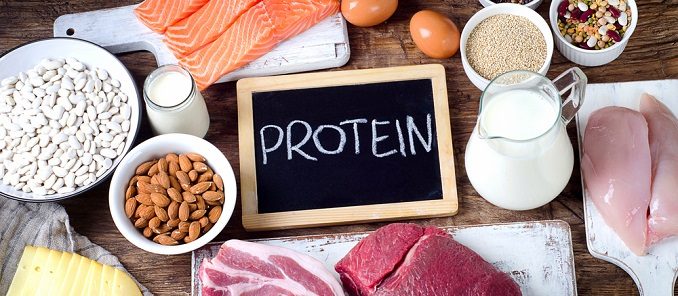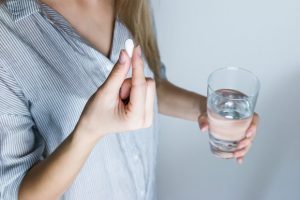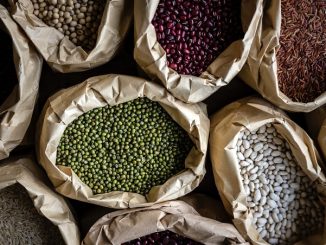
Levodopa is one of the main medications used to treat Parkinson’s symptoms. For some people, protein seems to interfere with how well levodopa is absorbed by the body. However, protein is essential to good health and should not be avoided! Protein plays an essential role in all body tissues. When dietary protein is in short supply the body tends to take protein from skeletal muscle to preserve more important tissues and body functions. This lack of protein can lead to muscle wasting over time. Less muscle means greater weakness and less mobility; both of which can increase risk of falls and fractures.
How much protein should I eat?
The amount of protein required each day depends on your body weight, age and health. As a rough guide, for adults aged 19-70 years, the recommended daily intake is as follows1:
| Recommended daily intake | |
|---|---|
| Women | 0.75 grams of protein per kilogram of body weight |
| Men | 0.84 grams of protein per kilogram of body weight |
For example- a women who weighs 71kg, should aim to eat about 53 grams of protein each day (0.75 x 71kg = 53.25 grams of protein). And a man who weighs 86kg, should aim to eat about 72 grams of protein each day (0.84 x 86kg = 72.24 grams of protein).
**To convert pounds to kilograms multiply pounds by approximately 0.454 (e.g. 160 pounds x 0.454 = 72.64 kilograms).
What about athletes?
Endurance and strength-trained athletes require more protein with 1.2-1.7 grams of protein per kilogram of body weight suggested each day2.
What about older adults?
Declining muscle mass is a natural part of aging. To maintain and regain muscle, older adults need to eat more protein.
A position paper from the PROT-AGE study group formed in 2013 recommends healthy older adults eat at least 1.0-1.2 grams of protein per kilogram of body weight each day3. Older adults who exercise and are otherwise active are suggested to consume >1.2 grams of protein per kilogram of body weight each day3.
Food sources
Protein can come from animal or plant foods such as:
- Meat, poultry, fish
- Meat alternatives e.g. tofu
- Eggs
- Legumes e.g. chickpeas, red kidney beans, lentils
- Nuts and seeds
- Dairy
- Soy products
Click here to see the amount of protein in a selection of foods.–
Digestion and absorption of protein
In your stomach, hydrochloric acid and enzymes break protein down into smaller chains of amino acids. From your stomach, these smaller chains move into your small intestine where enzymes break these chains into individual amino acids. Amino acid transporters carry these individual amino acids into your bloodstream for transport to various tissues of your body including your brain4.
Digestion and absorption of levodopa
Levodopa is a large neutral amino acid and like protein it is broken down to individual molecules in your small intestine. Amino acid transporters carry these molecules of levodopa into your bloodstream for transport to your brain. After passing the blood brain barrier, levodopa is converted into dopamine.
Levodopa is believed to compete with certain amino acids for its active transport across the small intestine and blood brain barrier4. If levodopa is consumed at the same time as protein, the levodopa may not be absorbed as efficiently.

Ideally take levodopa on an empty stomach or about 30 minutes before a meal e.g. take levodopa at 7am and then eat your breakfast at 7.30am.
Is it just protein that can interfere with levodopa absorption?
Another issue to consider for people with Parkinson’s when discussing levodopa absorption is gastroparesis, or slow stomach emptying. With this condition, food may remain in your stomach for an abnormally long time; and any levodopa taken while your stomach is full of food will be unable to exit into your small intestine. Instead, the levodopa must wait until your stomach clears. This delay may be minimised by taking levodopa on an empty stomach.
Special consideration:
- Levodopa can cause nausea, especially when treatment begins. This nausea can be minimized by taking levodopa with food until the nausea subsides.
Final thoughts:
- Work with your Doctor to set levodopa-containing medication times and then arrange meal times around these.
- Consult your Doctor before starting any kind of strength-training or exercise regime.
- Consult a Dietitian for individual advice regarding protein requirements.
Sources:
-
American Dietetic Association, Dietitians of Canada, American College of Sports Medicine, Nutrition and Athletic Performance, Medicine & Science in Sports & Exercise: March 2009, Volume 41, Issue 3, pg. 709-731
-
Bauer J, Biolo G, Cederholm T, et al. Evidence-based recommendations for optimal dietary protein intake in older people: a position paper from the PROT-AGE Study Group. J Am Med Dir Assoc. 2013;14(8):542-559
-
Camargo M. R. , Vuille-dit-Bille R. N., et al. The molecular mechanism of intestinal levodopa absorption and its possible implications for the treatment of Parkinson’s disease. Journal of Pharmacology & Experimental Therapeutics July 29, 2014.
Additional source:
-
Holden Kathrynne, Levodopa and Protein – What About it? January 2017
Parkinson Diet – Terms & conditions / Privacy policy


